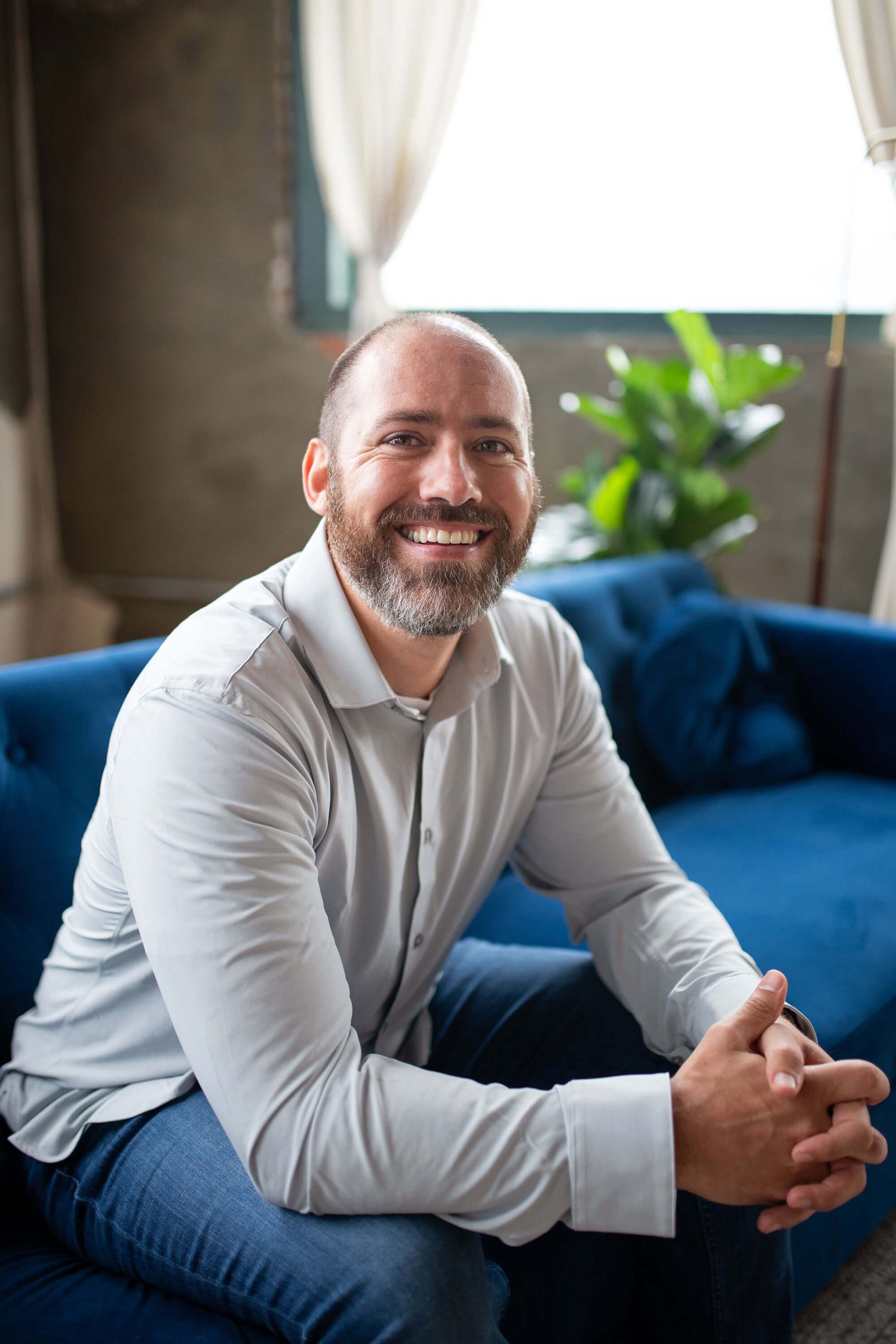Why Do Therapists Ask About Childhood?
Why do therapists always ask about your childhood? In this transcribed episode of The Shrink Think Podcast, Aaron and Nathan explore how your younger years impact who you are and what you're feeling in the present.
Aaron Potratz:
Hey everyone, welcome to the Shrink Think podcast. We're excited to be with you again today. I have a question for you. Have you ever wondered why the heck your therapist asked you about your childhood? Why do they always bring that up? I actually was talking with somebody about this and one of my clients was asking me like, "Okay, so I got to just ask you why do you need to go into my childhood? Can we just talk about what's happening right now?"
Nathan Hawkins:
No, I want to know how you built the sandbox, your little sandcastle on the beach.
Aaron Potratz:
Right. But there's a reason for that because everything that you know and that you are, everything about you was built in that sandcastle when you were five years old. No, it was built in your childhood. There's an actual reason why we ask all those questions because there's some really, really formative stuff that happens during those really important developmental times that we want to know what went down back then that is shaping and influencing and informing who you are today and why you might be where you're at. So before we get into that topic though, we want to tell you about a new service that we created called Shrink Think. These are short educational videos to inform you so you can be empowered to get the most out of your therapy experience.
Nathan Hawkins:
So just imagine you want to go to therapy, right? Yeah. I know it's hard, but you may be never done it before you even listening to the podcast. These videos, they are really short. They're like maybe two minutes each or whatever, and they go over things that would help you to understand what the process is going to be about and how long it goes, when it should be over, how to set your goals, what to expect from a therapist, how to confront your therapist, how to pay for it, a bunch of different things.
Aaron Potratz:
And these are the kinds of things that when you go to therapy over the first couple of sessions, maybe few, your therapist is going to be talking with you about those things and hopefully informing and educating you in session while you're preparing for the session. And so we were thinking, well, why don't we just take it out of the session and put it in your pocket, whether it's in your tablet, on your phone, your computer, so that you can watch these videos and listen to all that information on your own, on your commute or while you're walking or whatever, laying in bed, not sleeping.
Nathan Hawkins:
Also not paying for it
Aaron Potratz:
Yes. And also not paying for it. So yeah, these are just great educational videos because we want to help bridge the gap between therapists and clients.
Nathan Hawkins:
But first, let's get into your childhood.
Aaron Potratz:
Yes. So Nathan, tell me what happened exactly in that sandbox when you were five years old.
Nathan Hawkins:
Yeah. Well, part of the thing of it is that when you're a kid, there's different ways that we develop. So in the beginning, this guy, Piaget, and some people don't like Piaget, but who gives a crap? I like him. He's a developmental psychologist, and if you're my age, you have at some point probably heard about him in high school. I mean, this was not even a college thing, but at any rate, he talks about this thing called concrete thinking. So as a kid, what that means is that children don't have the ability to abstract think. So like when I was getting my extra qualification for child therapy, one of the things that we learned is you do not ask children why questions. You don't say why.
Aaron Potratz:
They ask you the why questions.
Nathan Hawkins:
And they don't even necessarily understand when they're asking why. They're not really asking what you think that they're asking because they can't hold those two things in their mind that are abstract. They don't know the process that they're in.
Aaron Potratz:
Yeah. It's like a simple cause and effect. What's the answer? Okay, got it. Let's move on.
Nathan Hawkins:
So that, if you think back to the arguments you might have got into as a kid is my dad's stronger than your dad. Your dad is the strongest man, so therefore he is the strongest man in the world. There is no one stronger. And it's the same thing with everything. So when you learn something as a kid, it's a fact. It's not debatable. It is the way that it is, which is why it's so formative because we just learn that stuff. And we learn a lot as kids. Think about, one thing I'll ask people is, "What do you know about dinosaurs?" And the chances are you did a dinosaur unit when you were in fourth grade, and everything that you know about dinosaurs, unless you're a discovery nerd happened when you are nine. Even right now, you're going mind blown.
Aaron Potratz:
This is what Nathan does in his therapy sessions. "I know you have some conflict going on that's really traumatic, but tell me about dinosaurs."
Nathan Hawkins:
Tell me about a Plesiosaurus.
Aaron Potratz:
A people Plesiosaurus, right?
Nathan Hawkins:
Right. So if you learn relational dynamics also, right, so how your parents are or caregivers are, how other kids treat each other. That's just how things are. That's a fact. That's why a lot of people go, "Yeah, my childhood was fine." I mean, quite frankly, not a trigger warning by any stretch, but if you at a younger age realize that your childhood sucked, then it probably really sucked because you're looking at everybody else's childhood and going, "Mine is definitely not going that way." But everybody has malformations in childhood. Stuff that wasn't supposed to happen. And that's typically the root of how things go on in adulthood.
Aaron Potratz:
Yeah. And I'm going to speak to a couple other things as well. We'll get into some attachment stuff. We've spoken to attachment theory just very, very briefly in a couple of previous episodes. But I also want to talk about feelings and beliefs that get encoded in feelings. One of the things that will happen in childhood, when you're going through something, you'll feel something like this feeling will come up and you don't realize it because you don't have this conscious awareness. But in that moment, you make a conclusory belief. You believe something as a fact that's going on based on how you're feeling or how you're experiencing that person or that situation.
And oftentimes that belief gets encoded into the feeling, meaning that every time you feel that feeling, I always think about it like a wave. Whenever that wave comes over you, there's this little computer chip that's in that feeling, that belief that gets activated of like, "Oh no, this is terrible", or "I'm in danger", or "Everybody hates me", or "I'm no good", or whatever that belief is, that gets activated and it starts there in childhood because it's just so powerful.
You're just a flood of emotions and hormones and experiences. And if you don't have anybody helping you to organize those things and understand what's really happening, then you might not even realize that those beliefs are getting encoded or even what they are. So that later on, you just start carrying those things through your life. And this thing called confirmation bias will happen where you'll have another experience later in childhood or teenage years or even young adulthood, and it'll confirm what you felt and what you believed. Because in a way, you're looking for that to be true. You don't want it to be, but you're like, "Ah, I knew it. There it is." And it just reinforces that dang thing over and over and over.
Nathan Hawkins:
And the thing of it is is you don't know. And so think of the folks out there, I'm thinking of right now are the ones, "My parents were pretty good. They helped me process stuff." Well, I'm sure that they did. But the reality is that they did not know. And you did not know every single time that you have a wave. Kids don't know that. They just have, and you have the same neurophysiological system that you had back then.
Aaron Potratz:
What is that word?
Nathan Hawkins:
Neurophysiological. So the way that your body moves blood and energy around inside your body, it's the same way that it moved it back then as how it moves it now. So if you're terrified now because somebody's going to beat you with a bat, you're scared and you see them-
Aaron Potratz:
Or shove you in a box.
Nathan Hawkins:
You're like, "Wow, that's really realistic. I'm terrified." But when you're little and you see maybe a monster, not necessarily a monster, well, maybe a movie, it's a monster movie of some kind, that's not real. But the same fear that you have when you're little about that monster is going to be the same fear you have with that dude that's going to hit you with a bat. It's like your body's working the exact same way, is my point. And so your beliefs that are organized around that, organize just as firmly as they would in either situation, whereas later you might be, "Man, that really scared me, and every time somebody grabs a bat, I freeze and I freak out." Well, that makes sense because that actually happened to you. But that same reality is true. "I can't watch monster movies because I freeze and I just can't watch those." Well, it's just a movie. You can move past that. There's not really a reason for you to be scared, bro. Sorry, it's the same body, same system.
Aaron Potratz:
And so in the same way, there's also this other thing called attachment when your birth to six months or so. And then for the first few years of your life, that's getting reinforced. And like I said, we've talked about it in a couple of previous episodes. We're not going to go into that in depth, but there's lots of literature out there. There's been a lot more research in the last 40 years or so about this. And Bowlby, Maine, Ainsworth, these are all the different kinds of names that you could research out there about attachment theory. But essentially the idea is that you learn how to connect with and be in tune with another person in relationships through those early experiences with your caregiver, your-
Nathan Hawkins:
In your same body.
Aaron Potratz:
Yes, in your same body, not somebody else's body. And so those experiences tell you what's safe, what's not safe. If you're okay, if there's something wrong with you, you believe that there's something wrong with you, that's one of those messages that can get encoded at a very young age, or if other people are safe, or how secure that relationship is, how predictable that connection or that intimacy is going to be. So all that throughout your childhood, those early connections, and then how those play out in those early years of your life are building and framing and reinforcing all these experiences and beliefs about yourself, about other people, relationships in the world.
And you don't realize it, but when you enter into the world as a 20-something or whatever, you're carrying all that with you. And again, like you're saying, Nathan, some of this stuff you can be aware of, you can say, "Oh yeah, I'm aware of this. My dad was an alcoholic and we had to take care of him", or whatever. Okay, you can be aware of some of that, but the stuff that was never seen, never talked about, never acknowledged, that's hidden. It's buried somewhere and it will come out. You can dig and find it if you go to therapy long enough.
Nathan Hawkins:
For the rest of your life.
Aaron Potratz:
If you do the work, we can help you find that stuff because it will manifest itself in your life. And that's why we're talking about it, because eventually this stuff that was so critical in building the foundation of who you are in your relationships and your connection to the world, it's going to manifest itself somewhere in your life.
Nathan Hawkins:
Peter Levine has another way of saying this type of stuff. He calls it the felt sense. It's this idea that if you picture going into a, I don't know, a forest and you're maybe taking a walk by yourself, you're hiking, and then you just be quiet and notice what the forest feels like to you, you might feel like temperature and literally try to listen to the silence. That idea of when we're growing up, we're building that felt sense. It's the idea of how things feel around us. So if you, depending on your level of danger, for example growing up, will be how tuned in you are to those types of things that are more dangerous. We just do it. It's the way that we survive and stay alive. So in the same way that how you feel when you're with your mom, how you feel when you're with your dad, how you feel when you're with whatever caregiver that you happen to be with-
Aaron Potratz:
Or if you're around conflict, for example.
Nathan Hawkins:
That's going to inform you later in life. So it's just going to feel a certain way. And until you learn how you're feeling it, you won't be able to articulate it because there was no reason for you to articulate it ever before. You never put words to it. Why would you what those words are if you've never done it?
Aaron Potratz:
And so just connecting that with you right now, like okay, you're coming to therapy, you're an adult, you're having some problems, or you're experiencing something in yourself or maybe in your relationships, and something in there is informing you, "Hey, there's a problem here." It's like what you're saying is you don't know it's a problem. You don't even know it's there until it starts showing up, until you're reacting to somebody or until somebody's like, "Whoa, what is going on with you? You don't seem like you're okay or whatever." And you're like, "What do you mean?" It's like people will start to see it, or maybe you'll start to see it in yourself and have no idea what it is or where it's connected to.
Nathan Hawkins:
Yeah. Take something simple anger, right? Somebody's told you, "You got an anger management problem. You need to go to therapy." I don't know why they sound like a redneck, but they do. That's just the way it is.
Aaron Potratz:
But don't worry, they're always wrong.
Nathan Hawkins:
So the reality is anger's caused for one of two reasons. It's either expectations and goals that are not met or boundaries that are crossed at the end of the day. So how did you develop your felt sense when you're growing up around expectations? At what point did you start getting irritable about something that's not working out? People told you, maybe your dad or whatever told you all the time, "Hey, we're going to go to a movie." And then you never did, so you just didn't believe him after a while. And right now, before processing stuff and going into your childhood, you wouldn't have any idea, like that wouldn't have mattered to you. You might say in a random conversation, "Oh yeah, my dad always told me we were going to movies, and I never went. It's like I could never believe anything he said."
And that's it. You don't care. And there's no relationship in your mind to that event, those events and the anger that you have now. But there is a relationship because you developed your felt sense around that, and you felt like, "Man, why are you even talking to me about this stupid movie when you're not going to go?" And that same felt sense might feel similar when your spouse is telling you something that you just don't believe is going to happen. And now you're getting angry about something and so that's why we go in. You can kind of see that tie. So that's why we go back there.
Aaron Potratz:
And I would add just one more, since we're talking about anger, I would add that oftentimes that can come up when we feel like an injustice has occurred, and that might be connected to a boundary was crossed, but some people experience it as like, "Oh, an injustice has occurred. Something unfair or injustice happened to me and I'm getting angry about it to defend myself", or whatever. Talking about movies, the thing that I think about with that is Batman. I love that movie as a kid. I watched the original Batman with Michael Keaton. I think it was a Tim Burton movie, pretty dark. But I loved it because you see, and I really do think there was something about this that connected with me as a therapist-
Nathan Hawkins:
As a dark child.
Aaron Potratz:
Yeah, right. Well, it's funny, we were talking about this before recording about this show, Three's Company, about something that was just this big misunderstanding. And you were telling me like... Well, I'll let you share.
Nathan Hawkins:
That's a good proportion of why I'm a counselor right now, because every stupid show is about misunderstanding. And I couldn't wait to have the misunderstanding cleared up.
Aaron Potratz:
Not that we have any unresolved issues from childhood, but there you go.
Nathan Hawkins:
Don't misunderstand me.
Aaron Potratz:
It's that same thing with Batman. When I watched it when I was a kid, it was essentially, okay, his parents are murdered, so there's an injustice that's occurred, and now he's this justice vigilante, and anytime some sort of an injustice has occurred with anybody, he takes action and has got to go protect or whatever. It's that same thing that is just so palpable in your body, and it just motivates you to take action. And in his case, he's made a career out of being this superhero, whatever. And again, it's fake. It's a movie or whatever.
Nathan Hawkins:
What?
Aaron Potratz:
Sorry, Santa Claus is not real, also.
Nathan Hawkins:
What? Don't ruin all of it. Yes, that's not... Aaron, shame.
Aaron Potratz:
All in one episode, bring it in. But that's a great example of how this stuff can manifest itself in your life and why if Batman were to go to therapy, what happened in your childhood? Clearly something really big happened.
Nathan Hawkins:
Well, then the therapist would take away a superpower of justice and then Gotham would die. That's what would happen?
Aaron Potratz:
No, we don't. I guess that's worth saying, we don't want to take away those superpowers that come from it. We just want to resolve that the rough edges around it or the unhealth of it, while still maintaining all the benefits that you've developed in yourself and in your life because of it.
Nathan Hawkins:
Giving you a mindfulness about it. It's like exploring this. And then you get to decide, "Wow, do I really just do it for that? That's weird. I don't really care about that anymore."
Aaron Potratz:
In some ways, yeah, it's a mindfulness, or you could even say it's taking it from being an unconscious, repressed and reactive, almost like just this automatic thing into being something that's conscious, intentional, and like "Okay, I know what I'm doing."
Nathan Hawkins:
Some of the best stuff is when people come to a conclusion that's like, "Wow, I'm really doing that because of this, because there's really no other emotional information that I'm using here." And it becomes completely preposterous. And those are situations where people are able to change extremely quick. They'll go like, "Oh, well, I'm just not going to do that." And it doesn't even feel like they should do it again. Those are really cool, which is also why we go back down there because it's easy to untie something at the beginning of the knot.
Aaron Potratz:
Or on the other side. Some people will continue to do the same thing. They're like, "Well, I still want to do this, but now I'm consciously choosing it." And so it's a choice and I know why I'm doing it. I'm doing it for some other reasons other than I don't even know why. I just feel compelled. But now they can say, "Oh, I want to do this for this specific reason or this value that I hold."
Nathan Hawkins:
It becomes a part of maturity to where maybe before you were criticized for the way that you're being about something, and then we figure out through it that you own it, and then you do it a little bit different and somebody criticizes you again 'cause it sounds the same to them. And you say, "No, I'm going to say this to you. It's just that I think you're probably hearing me like this, but this is what I mean." And it becomes a movement of maturity. So.
Aaron Potratz:
An integration and ultimately, that's what we want. We want this stuff that maybe had been repressed or had been stuffed down. Maybe you didn't even know anything about it.
Nathan Hawkins:
Just unknown.
Aaron Potratz:
Just unknown. And that's not your fault. There's no way you could have known it. But now we need to know it. And it's not like we want to stay in childhood while we're talking about stuff in therapy. We want to get out at it. We want to gather the information, bring it into the present, and deal with it now so that you can integrate it into a more whole and authentic version of yourself.
Nathan Hawkins:
We thank you so much for listening, and have a great day.
Aaron Potratz:
Thanks for listening to our show. Don't forget to head over to Apple Podcasts, Spotify, Stitcher, or wherever you get your podcast, to leave us a review and subscribe to our podcast so you never miss an episode. You can also sign up for our free email course, Nine Ways to Overcome Fear and Self-Doubt, and you'll get nine weeks worth of customized, practical strategies you can use to get past the fear that's holding you back in your life. Thanks again for listening.

Aaron
Aaron brings incredible passion, authenticity, and humor to all that he does - whether by providing care in his clinical practice or offering guidance in his consulting business. Aaron is a Licensed Professional Counselor and Clinical Supervisor in Oregon, the owner of Discover Counseling, and co-owner of Life Discovery Counseling Services. He maintains his own client caseload while managing his group practices and supervising his counseling staff. Aaron is also a private practice consultant and co-hosts the Shrink Think Podcast with Nathan Hawkins.




